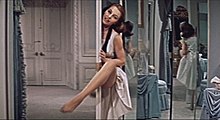
Ninotchka is a 1939 American romantic comedy film made for Metro-Goldwyn-Mayer by producer and director Ernst Lubitsch and starring Greta Garbo and Melvyn Douglas. It was written by Billy Wilder, Charles Brackett, and Walter Reisch, based on a story by Melchior Lengyel. Ninotchka is Greta Garbo's first full comedy, and her penultimate film; she received her third and final Academy Award nomination for Best Actress. In 1990, Ninotchka was selected for preservation in the United States National Film Registry by the Library of Congress as being "culturally, historically, or aesthetically significant". In 2011, Time also included the film on the magazine's list of "All-Time 100 Movies".

Fred Astaire was an American dancer, actor, singer, musician, choreographer, and presenter. He is widely regarded as the "greatest popular-music dancer of all time". He received numerous accolades including an Honorary Academy Award, three Primetime Emmy Awards, a BAFTA Award, two Golden Globe Awards, and a Grammy Award. He was honored with the Film Society of Lincoln Center tribute in 1973, the Kennedy Center Honors in 1978, and AFI Life Achievement Award in 1980. He was inducted into the Hollywood Walk of Fame in 1960, American Theatre Hall of Fame in 1972, and the Television Hall of Fame in 1989.

The Band Wagon is a 1953 American musical romantic comedy film directed by Vincente Minnelli, starring Fred Astaire and Cyd Charisse. It tells the story of an aging musical star who hopes a Broadway show will revive his career. However, the play's director wants to make it a pretentious retelling of the Faust legend and brings in a prima ballerina who clashes with the star. Along with An American in Paris (1951) and Singin' in the Rain (1952), it is regarded as one of the finest Metro-Goldwyn-Mayer musicals, although it was a box-office disappointment on first release.
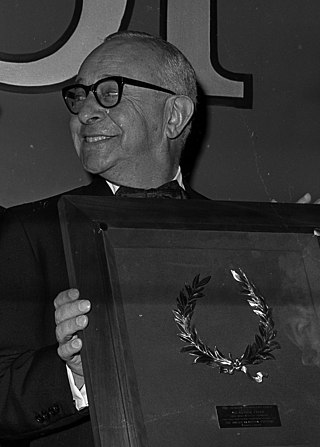
Arthur Freed was an American lyricist and a Hollywood film producer. He won the Academy Award for Best Picture twice, in 1951 for An American in Paris and in 1958 for Gigi. Both films were musicals, and both were directed by Vincente Minnelli. In addition, he produced the film Singin' in the Rain, the soundtrack for which primarily consisted of songs he co-wrote earlier in his career.

Alvin Morris, known professionally as Tony Martin, was an American actor and popular singer.

Cyd Charisse was an American dancer and actress.
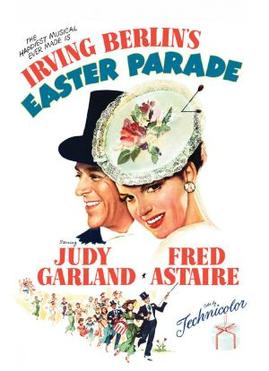
Easter Parade is a 1948 American Technicolor musical film directed by Charles Walters, written by Sidney Sheldon, Frances Goodrich, and Albert Hackett from a story by Goodrich and Hackett, and starring Judy Garland, Fred Astaire, Peter Lawford, and Ann Miller. The film contains some of Astaire's and Garland's best-known songs, including "Easter Parade", "Steppin' Out with My Baby", and "We're a Couple of Swells", all by Irving Berlin.

Silk Stockings is a musical with a book by George S. Kaufman, Leueen MacGrath, and Abe Burrows and music and lyrics by Cole Porter. The musical is loosely based on the Melchior Lengyel story Ninotchka and the 1939 film adaptation it inspired. It ran on Broadway in 1955. This was the last musical that Porter wrote for the stage.

That's Entertainment! is a 1974 American compilation film released by Metro-Goldwyn-Mayer to celebrate the studio's 50th anniversary. The success of the retrospective prompted a 1976 sequel, the related 1985 film That's Dancing!, and a third installment in 1994.
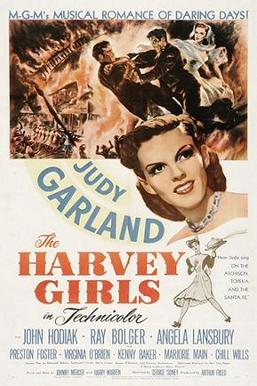
The Harvey Girls is a 1946 Technicolor American musical film produced by Arthur Freed for Metro-Goldwyn-Mayer. It is based on the 1942 novel of the same name by Samuel Hopkins Adams, about Fred Harvey's Harvey House waitresses. Directed by George Sidney, the film stars Judy Garland and features John Hodiak, Ray Bolger, and Angela Lansbury, as well as Preston Foster, Virginia O'Brien, Kenny Baker, Marjorie Main and Chill Wills. Future star Cyd Charisse appears in her first speaking role on film.

Rouben Zachary Mamoulian was an American film and theater director.

Ziegfeld Follies is a 1945 American musical comedy film released by Metro-Goldwyn-Mayer, primarily directed by Vincente Minnelli, with segments directed by Lemuel Ayers, Roy Del Ruth, Robert Lewis, and George Sidney, the film's original director before Minnelli took over. Other directors that are claimed to have made uncredited contributions to the film are Merrill Pye, Norman Taurog, and Charles Walters. It stars many MGM leading talents, including Fred Astaire, Lucille Ball, Lucille Bremer, Fanny Brice, Judy Garland, Kathryn Grayson, Lena Horne, Gene Kelly, James Melton, Victor Moore, William Powell, Red Skelton, and Esther Williams.
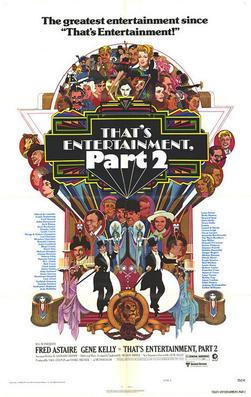
That's Entertainment, Part II is a 1976 American compilation film released by Metro-Goldwyn-Mayer and a sequel to That's Entertainment! (1974). Like the previous film, That's Entertainment, Part II was a retrospective of famous films released by MGM from the 1930s to the 1950s. Some posters for the film use Part 2 rather than Part II in the title.

Daddy Long Legs (1955) is a musical comedy film set in France, New York City, and the fictional college town of Walston, Massachusetts. The film was directed by Jean Negulesco, and stars Fred Astaire, Leslie Caron, Terry Moore, Fred Clark, and Thelma Ritter, with music and lyrics by Johnny Mercer. The screenplay was written by Phoebe Ephron and Henry Ephron, loosely based on the 1912 novel Daddy-Long-Legs by Jean Webster.

This is a comprehensive guide to over one hundred and fifty of Fred Astaire's solo and partnered dances compiled from his thirty-one Hollywood musical comedy films produced between 1933 and 1968, his four television specials and his television appearances on The Hollywood Palace and Bob Hope Presents the Chrysler Theatre which cover the period from 1958 to 1968. Further information on the dance routines may be obtained, where available, by clicking on the film links.

Janis Paige is an American retired actress and singer. With a career spanning nearly 60 years, she is one of the last surviving stars from the Golden Age of Hollywood.
Eugene Loring was an American dancer, choreographer, teacher, and administrator.

It's Always Fair Weather is a 1955 MGM musical satire scripted by Betty Comden and Adolph Green, who also wrote the show's lyrics, with music by André Previn and starring Gene Kelly, Dan Dailey, Cyd Charisse, Dolores Gray, and dancer/choreographer Michael Kidd in his first film acting role.
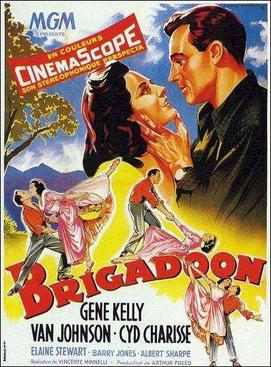
Brigadoon is a 1954 American Metro-Goldwyn-Mayer musical film made in CinemaScope and color by Ansco based on the 1947 Broadway musical of the same name by Alan Jay Lerner and Frederick Loewe. The film was directed by Vincente Minnelli and stars Gene Kelly, Van Johnson, and Cyd Charisse. Brigadoon has been broadcast on American television and is available in VHS, DVD and Blu-ray formats.

John Melvin Bleifer was an American actor whose career began at the end of the silent film era, and lasted through the mid-1980s. He appeared in feature films and film serials, and in a number of television series and miniseries. Bleifer also acted on stage, and appeared in several Broadway productions.

